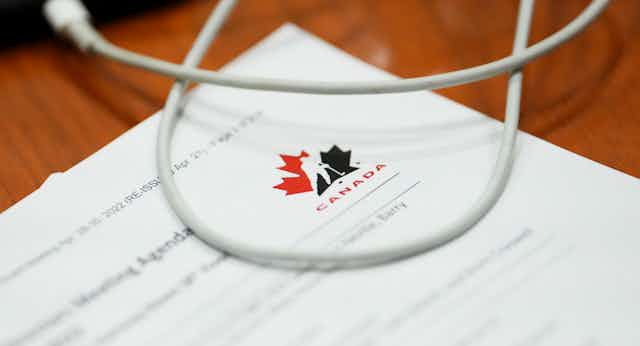Five Canadian world junior hockey players face sexual assault charges in connection with the events that allegedly occurred in a hotel room after a Hockey Canada gala in 2018 held in London, Ont.
A female victim alleges to have been sexually assaulted by these players. She claims to have been intoxicated, that she did not provide consent and that she felt unable to leave the hotel room.
The players are expected to plead not guilty, according to statements from their lawyers.
Hockey culture has been described as sexist, misogynist, homophobic and hypermasculine. At the end of 2022, Hockey Canada’s CEO and entire board of governors stepped down after intense public and government outrage over the handling of this sexual assault case that is currently set to go before the courts.
Read more: Showered in sexism: Hockey culture needs a reckoning
Sexual assault is a gendered crime
Aside from a drop in reported sexual assault in 2019, there’s been an increasing trend of sexual violence across the past several years in Canada. Although any gender can be a victim of sexual assault, it is estimated that women are five times more likely than men to be victims of sexual assault in Canada. Approximately 47 per cent of sexual assault occurs against females between the ages of 15 to 24 years of age.
Although estimates vary, as few as five to six per cent of sexual assaults may be reported to police. Victims may decide not to report the assault for several reasons, which include fearing not being believed, feeling shame and embarrassment about the assault and thinking that the perpetrator will not be punished. As well, conviction rates for defendants charged with sexual assault can be as low as 0.3 to 1.6 per cent.
Rape myths are “prejudicial, stereotypes, or false beliefs about rape, rape victims, and rapists.” The acceptance of these myths shifts the responsibility of sexual assault from the perpetrator to the victim.
In one U.S. study, 25 per cent of participants (32 per cent of men and 19 per cent of women) accepted the myth, “She asked for it.” In a sample of male college students in the U.S., rape myth acceptance was related to the risk of perpetrating sexual violence.
Consent while intoxicated
The Criminal Code of Canada defines consent as the “voluntary agreement of the complainant to engage in sexual activity in question.” Determining consent while intoxicated is complicated, because intoxication may or may not render someone incapable of providing consent. Canadian triers of fact are required to determine if an individual’s level of intoxication reaches a threshold that renders them incapable of providing consent.
Social status
The status of a perpetrator may make victims less likely to come forward. However, several high-profile defendants have been charged and convicted. For example, in 2023, actor Danny Masterson was sentenced to 30 years to life for the sexual assault of two women. Masterson is currently in prison serving his sentence.
Empirical research has found that mock jurors can perceive high status defendants to be guilty in sexual violence cases. In one study, a victim was viewed more positively when the defendant was of high status in a child trafficking mock juror trial. In addition, mock jurors who were well informed about child trafficking did not engage in victim blaming.
Perceptions of guilt
To better understand the interaction between intoxication, social status and perceptions of sexual violence, we conducted a juror decision-making study using the case context of an athlete being accused of sexual assault.
We manipulated the social status of the defendant (high or low), the social status of the victim (high or low), victim gender (male or female), and the reason the victim was unconscious during the sexual assault (consuming alcohol or consuming cold medicine). Participants read a mock-trial transcript.

Perceptions of guilt were influenced by the defendant’s social status and the reason the victim was unconscious. When the defendant was of low status and the victim was unconscious due to alcohol consumption, the defendant was perceived to be more guilty than when the victim was unconscious due to taking cold medicine.
The female victim was viewed as having more control over the situation when the defendant was of high status (a star athlete) and unconscious due to alcohol consumption rather than cold medicine.
Overall, these results suggest that victims may be viewed as more blameworthy for the sexual assault when alcohol is consumed.
Debunking rape myths
Victims of sexual assault who have consumed alcohol may be viewed as more responsible for the sexual violence when the perpetrator is of higher status.
Shifting the responsibility of sexual assault from the perpetrator to the victim is consistent with rape myth acceptance. Victims who choose to consume alcohol may be perceived as more in control of the situation when the defendant is high status.
Sexual assault awareness programs need to continue to debunk rape myths and destigmatize being sexually assaulted. Education and the media may be able to correct misinformation about victims and sexual violence.

